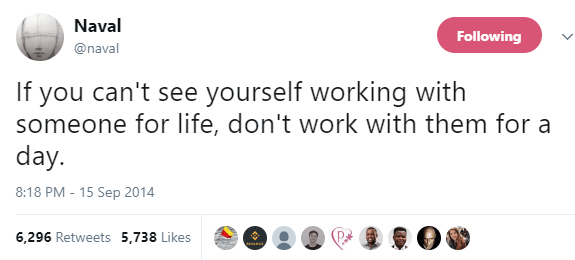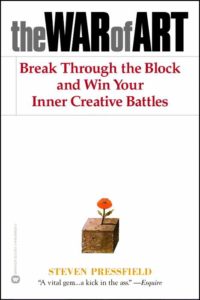
5 min read
THIS POST MAY CONTAIN AFFILIATE LINKS. PLEASE READ MY DISCLOSURE FOR MORE INFO.
If you wanted a mentor 20 years ago, you had to find a way to be in close proximity to them. You had to work for them, be a student in their class, or attend their conferences.
Nowadays, you can access the wisdom of any mentor simply by going online and reading their blogs, listening to their podcasts, and watching their videos.
This year I have spent more time soaking up knowledge from successful authors, entrepreneurs, and financial gurus than ever before. Here are 7 lessons I learned from 7 mentors this year that changed my life.
Mentor: Naval Ravikant
Lesson: Greatness comes from compound interest, whether it’s in investments or it’s in relationships.
I first heard Naval say this on this Tim Ferriss podcast episode. I heard him repeat this maxim on this episode of The Knowledge Project podcast.
If you want great relationships and wealth, you must invest consistently over the long haul. The great returns come from the compound interest that occurs over the course of many decades.
Financially this makes sense, but I had never thought of applying the concept of compound interest to relationships. Naval shared his thoughts on this idea in a tweet a few years ago that went viral:

The more I think about it, the more it makes sense. Warren Buffett and Charlie Munger have been partners for over 50 years. Their relationship has lead to tremendous wealth.
Married couples who seem to have the strongest relationships are the ones who have been together for decades. Great things really do compound over time.
I particularly like this idea because it encourages long-term thinking. It forces you to think about who you want to surround yourself with over the course of the coming decades, not just the coming years.
Additional Resources: You should follow Naval on Twitter. He regularly tweets philosophical gold. Also, check out the Twitter accounts that he personally follows.
Mentor: Charlie Munger
Lesson: The best source of new business is the work on your desk.
Charlie Munger is Warren Buffett’s right-hand man at Berkshire Hathaway. He is a living tree of knowledge. I first came across the above quote in Poor Charlie’s Almanack, a collection of speeches and talks made by Charlie over the years.
This idea is simple: if you want to be promoted, focus solely on crushing your current project at work. If you want new clients for your business, do a great job with the work you have for existing clients – this will lead to referrals. If you want a larger audience online, focus on your current project, blog post, or video.
This is the philosophy that Charlie and Warren follow. They focus on the day-to-day research of finding great companies at reasonable prices to invest in. The stock returns take care of themselves over time. Over the past 50 years, this approach has helped Berkshire Hathaway crush the S&P 500:

Additional Resources: Shane Parrish over at Farnam Street Blog wrote a nice article explaining Charlie’s concept of using “mental models” to approach problem solving.
Mentor: Ryan Holiday
Lesson: The relationship between ‘talk’ and ‘work’ is that one kills the other.
This is arguably my favorite lesson I learned this year. Ryan says that the more you ‘talk’ about your work, (i.e. tell your friends, talk about it on social media, hype it up online) the less work you’re actually doing. Talking is a form of procrastination. It slows you down.
When actively working on a project, focus on the work. You can talk about it and promote it once it’s finished.
Additional Resources: Ryan’s books Ego is the Enemy and The Obstacle is the Way are both worth reading.
Mentor: Steven Pressfield
Lesson: Don’t stress about doing good work. Just show up every day and work. This kills “The Resistance.” Over time, your work will improve.
I learned this lesson in Pressfield’s book The War of Art. He says most people never create the work or art they desire to because they give in to “The Resistance.” This is the internal force that rises up against us to stop us from doing important work we know we should do. It prevents us from creating art.

The way to overcome “The Resistance” is through showing up consistently every day to do your work and create your art. You don’t have to do good work initially. Just show up. Put in the hours. This kills resistance. Over time, your desire to procrastinate will dwindle, your skills will increase, and your work will improve.
Additional Resources: Check out Pressfield’s blog (but only after you have done your important work for the day).
Mentor: Cheryl Strayed
Lesson: You don’t have to explain your life path to other people.
Cheryl preached this message in many forms in Tiny Beautiful Things, the most surprisingly kick-ass book I read this year. It’s a collection of pieces of advice she gave to readers in a column she used to write called “Dear Sugar”.
Often readers would ask her for advice on love and life, wondering how to explain their life path and their actions to the people around them. More often than not, Cheryl would simply tell the reader that they didn’t have an obligation to explain themselves to anyone. If they felt led to pursue a certain job, move to a new city, or live a certain way, they had the right to do so without offering up an explanation to anyone.
I think this message is especially relevant in the F.I.R.E. community. Most people don’t understand why many of us choose to save 50% + of our income. Fortunately, they don’t need to understand. Nor do they need to agree with it. As Cheryl says, you aren’t required to explain your lifestyle to anyone. Live and let live.
Additional Resources: Cheryl has a podcast called Dear Sugars where she answers difficult, real life questions from listeners.
Mentor: Leo Babauta
Lesson: There is plenty of time in the day if you only focus on the essential.
I first came across Leo in the film Minimalism on Netflix. He is a husband, father of six, best-selling author, and runs a blog with millions of monthly readers. He explains how he finds time for both his work and his family in his novel The Power of Less.
Essentially, Leo says that most of us have plenty of time each day to spend with family and do work we enjoy, but most of us waste our hours. The way to improve our finances, relationships, and health is to only focus on the essential. Ignore everything else.
This means working on only the most important projects, spending money only on things that bring the most value, spending time only with people who bring joy, and embracing simplicity.
Additional Resources: Check out Leo’s blog Zen Habits. It revolves around minimalism, simplicity, habits, and meaningful living.
Mentor: Kai Greene
Lesson: Grit beats talent.
Kai Greene is arguably the most popular professional bodybuilder in the world. He is known for his insane work ethic and his 3 – 4 hour gym sessions.
I first came across Kai on YouTube a few years ago and have been following him ever since. The biggest lesson I have learned from him is that grit beats talent any day.
Kai grew up as an orphan and lived in poverty for many years in New York. He was never the tallest or strongest kid, but when he entered the bodybuilding scene in his teenage years he quickly became known for his gritty attitude.

He didn’t have the best genetics, but he was willing to spend more hours in the gym than anyone else. This helped him rise to prominence and win some of the biggest bodybuilding shows on earth.
Kai taught me that grit and consistency are the key drivers of success. Most importantly, they’re completely within one’s control. Genetics and natural talent certainly play a role, but they’re not malleable like grit.
Additional Resources: Another great resource on the power of grit and determination is the book Grit by Angela Duckworth.
Did you have any influential lessons you learned from mentors in 2017?
- The Ad Revenue Grid - August 6, 2021
- Attract Money by Creating Value for a Specific Audience - July 13, 2021
- The 5-Hour Workday - March 26, 2021
Full Disclosure: Nothing on this site should ever be considered to be advice, research or an invitation to buy or sell any securities, please see my Terms & Conditions page for a full disclaimer.

These are all great lessons. I’m a big fan of Wild, so I’d definitely be interested in checking out Tiny Beautiful Things. For me, one of the most life-changing ideas/lessons that I read about this past year was Derek Sivers’ “hell yeah” or “no” rule. I first read about it in Essentialism, but have since read stuff that Sivers wrote about it and listened to him speak. I’ve been applying that rule to my own life, that if something isn’t a “hell yeah” it’s a “no”.
That’s funny, I almost included Derek Sivers on this list! I love his “hell yeah or no” approach as well. It’s a great way to only spend time on things you’re excited about and ignore the rest. Sivers is a contrarian thinker in a lot of ways. I often read his blog posts to acquire new ways of thinking about different topics.
Nice list and agreed on Sivers. His book on the CD Baby experience is a really good read.
A lot of great lessons here, thanks Zach! Are you familiar with Impact Theory? It’s the latest project from Tom Bilyeu who was successful with Quest nutrition bars. He interviews and discusses lessons from many of the people I’ve seen you recommending and I think you’d enjoy it. I typically listen to the episodes in podcast form while I’m at the gym or driving. Here’s a link to their book recommendations list, which I’m sure you’ll find a lot of agreement with: http://impacttheory.com/reading-list/
Hey Andy,
No I actually have never heard of that project. Thanks for linking to that book list, I’ll definitely check it out. This makes me excited, I love finding new sources for learning. Thanks for sharing! I also listen to podcasts while driving – it’s such a simple way to soak up some knowledge on the my morning commute to work every day.
This is a fantastic list Zach, 7 truly life changing lessons if we can all put these into practice. I think my favorite one is “You don’t have to explain your life path to other people.” I love that. We all need to focus on living our best life, no matter what the people around us think. We don’t have to explain ourselves.
Congrats on an incredible year Zach, it’s been great following along your personal progress and your blog’s growth throughout the year! I have no doubt you’ll have an even brighter 2018 ahead.
Yeah Cheryl Strayed is fantastic, she just tells it like it is. I appreciate you following along and always leaving encouraging feedback! Best of luck to both of us in 2018!
Awesome read! I’ve added The War of Art to my reading list.
Thank you! The War of Art is a great book, it’s also very short so it’s an easy read. It’s one I revisit often.
Some real gold nuggets here. Tha k you for sharing this wisdom. Its given me new things to think and read about.